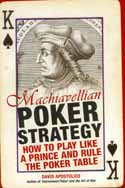
Machiavellian Poker Strategy
What's Luck Got To Do With It?
I play in a bi-weekly home game in which I do quite well. There is an assortment of players who regularly attend representing various skill levels. Some of the players are anxious to learn and will David Apostolico is the author of 'Machiavellian Poker Strategy', and 'Tournament Poker and The Art of War,' and his latest title 'Poker Strategies for a Winning Edge in Business.' David's website is www.holdemradio.com/blog/ ask me a ton of questions. I am more than happy to provide advice if asked but rarely will I if I am not asked. Needless to say, many of the players are in great need of help and have obvious glaring holes that could be fixed with minimal effort. The bottom line is that many have a lack of understanding of fundamental concepts.
David Apostolico is the author of 'Machiavellian Poker Strategy', and 'Tournament Poker and The Art of War,' and his latest title 'Poker Strategies for a Winning Edge in Business.' David's website is www.holdemradio.com/blog/ ask me a ton of questions. I am more than happy to provide advice if asked but rarely will I if I am not asked. Needless to say, many of the players are in great need of help and have obvious glaring holes that could be fixed with minimal effort. The bottom line is that many have a lack of understanding of fundamental concepts.
This past weekend as it was getting late in our hold ‘em tournament, I won a hand when one of the other players remarked that “does anyone notice that Dave always gets hands at the end”? The obvious indication meaning that I get lucky at the end. Sure, there is a certain amount of luck involved in poker. But if this player really thinks that I come in first or second over 90% of the time due to luck, then he is really missing the boat here.
I asked him if he knows why I get hands at the end. He seemed genuinely confused by the question. I didn’t bother to answer it for him but rather informed him that if he could answer that question, it would go a long way to improving his poker game. I’ll offer the answer here and, perhaps, my opponent will read it.
The reason is not luck but in fact the opposite. I minimize luck. If I have a strong hand, I force others out and protect my hand. When others don’t do the same, then I play my drawing hands. So if I’m minimizing my luck and my opponent’s aren’t, then I’m protecting my hands while preserving the right to get lucky in the others. That’s not luck. That’s playing solid and taking advantage of others’ poor play. To give an example, we were down to 4 players in a game last week. One of the players limped pre-flop with pocket Kings and got two callers. Only one player folded. I was in the big blind and got a free look. I won’t reveal my cards just yet. The flop brought an ace. The small blind made a small bet, I called as did the player with pocket Kings. The turn brought another ace. There was another small bet from the small blind. Again, I called although now the player with pocket kings folded. The river brought a four and the original bettor bet again and I re-raised all-in. My opponent quickly called and turned over pocket Jacks! I had A-4 and made a full house on the river.
Now, let’s analyze the play. First, if the player with pocket Kings had raised pre-flop a decent amount, in all likelihood he would have isolated the pocket Jacks and would have won a big pot. Instead, he lost a substantial amount of money. At least he had the sense to fold when he knew one of his opponents had to have an ace. The player with pocket Jacks had to realize he was up against a weak ace. He should have either put on the brakes after the flop or applied maximum pressure after the turn. Instead, he did neither and went broke.
Now, did I get lucky? Absolutely. However, I had a huge stack and could afford to play and was the big blind in that hand and got to see a flop for free. I never would have even seen the flop if there had been an appropriate pre-flop raise from the Pocket Kings. Play to win and minimize luck at the table.

